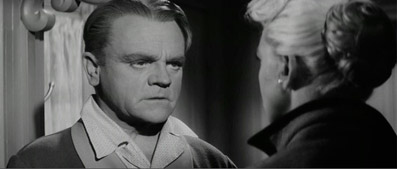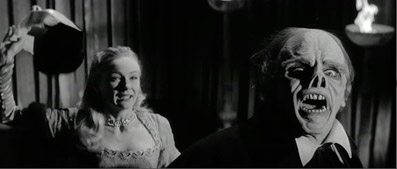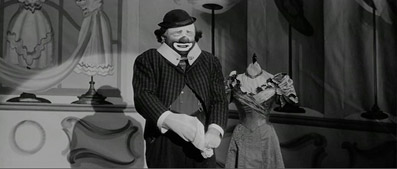| Gregory Speck: |
What advice would you give
someone just coming into the profession? |
| Jimmy Cagney: |
Just walk in, plant your feet,
look 'em in the eye, and tell the truth. |
| |
Cagney's last interview from worldandi.com |
There are precious few performers in Hollywood who are feted and celebrated not for what they bring to their characters but what of themselves they chose to share with the rest of us. Cagney had no equal. This isn't to say he was the greatest screen actor of his generation but he was, by a country mile, the best Jimmy Cagney we would ever get. Cited by Clint Eastwood as his favourite and most influential actor, it's easy to see how this rhythmic powerhouse of a man could impress. His delivery of lines is unmistakable – they are often fired at his co-stars like bullets. His restless energy, always spilling out like an overfilled mug, gives you the impression of a small but active volcano trying so very hard to keep the imminent eruption contained. The Cagney of the 30s and 40s (during which he played men of violence and faulty wiring) is not the Cagney you get in Man Of A Thousand Faces. Here, he is a concerned father, a family man with a temper and personality intertwined with the morals of the era. That's a polite way of saying that chauvinism, misogyny and a dread of anyone 'different' were all taken as perfectly reasonable attitudes in the era when the actor behind some of the more famous silent movies was plying his trade.

Lon Chaney was a versatile performer whose own make up work provided him with a vast amount of assignments in Hollywood during the silent era of cinema. He became famous playing a series of quintessential Hollywood horrors, (the most well known are probably the Phantom of the Opera and the Hunchback of Notre Dame). He often painfully contorted his body in order to portray the misfits at which he excelled. Known as 'the man of a thousand faces,' Chaney kept himself a mystery as a way to sustain interest in his work. For reasons beyond my understanding, the producers hired Jimmy Cagney to play approximately twenty-five years of the man's life. Now Cagney can do the physical stuff, no question and as a performer he's, well... he's Cagney. But in 1957, Cagney was fifty-eight years old. It's a tribute to the man's talent that the film is carried on his shoulders but all through the movie, you're seeing a middle to older aged man playing young to middle age and while the movie does what movies do, Cagney seems to stand unchanged in the middle of events while they breezily happen around him. The irony is almost tart. The star of a biopic about a man who was a wizard at make up seems to have none on when it comes to suggest his age varying from mid-twenties to late forties.
That said, there are other issues that pull the rug from under the movie. It's a celebration of a man's life that heavily involves his work in the roles that made him a household name. Silent movies require a form of acting that is very different to what we now regard as quality work. The physical is exaggerated and the facial expressions theatrical to the point of discomfort (as far as this viewer is concerned). When Cagney has to cover for his wife with a bit of impromptu clown acting, I found it very difficult to acknowledge that his antics would have produced any laughter, let alone riotous guffawing. I sat there a little uncomfortable with the over-the-top mugging. But then that's my issue being ensconced in 2009 and not being able to imagine what life and cultural norms were like at the start of the twentieth century. Cagney can do that 'big performing' but he can't make it play as it used to for a modern audience. The phrase 'old fashioned' has taken on a faint air of implied criticism, like a burr clinging on to a woollen sweater. But it can also simply be a statement. At least 'old fashioned' is still fashioned. But there's no doubt that Cagney's performance of a man with great physical dexterity includes touches that made this Yankee Doodle Dandy a great all-round star.
The story is a simple one, a real fifties' pot boiler. As a boy, Chaney is mocked because of his parents' disability. Both Chaney parents were profoundly deaf and by association, 'dumb'. He develops a thick carapace against those who would ridicule his loved ones. He starts to perform, gets married and despite his wife's over-reaching fear of the 'deaf and dumb' gene, the Chaneys have a perfectly healthy and normal child. The marriage goes south because his wife wants a life (too much to ask?) and Chaney wants a child minder. Telling his growing son that his mother is dead is a small sin that comes back to haunt him and a serious throat infection ends his relatively short life (Chaney died at forty-seven). For reasons the movie didn't really reveal, Lon Chaney was revered in Hollywood to the extent that in August 1930, the entire Hollywood movie industry shut down for a day in tribute to him. Have I missed something? Did he also run a school for deaf children or rescue orphans? The flippancy is not meant disrespectfully but he was 'just' an actor. The movie didn't really give us a clue why he was held in such high professional esteem.

The direction by Joseph Pevney (who died last year at ninety-six, not bad Mr. P.) is somewhat static; par for the course in the fifties, I suspect but there is a little frisson here for science fiction fans. Pevney, more well known for his TV work, secured the services of Celia Lovsky, a well known and respected movie actress, for a small part in a TV series a decade after working with her playing Chaney's deaf mother. Her character in that TV series inspired the name of a pop group and the episode in question is certainly one of the highlights of the show's three year run. It is, of course, Star Trek (Pevney helmed fourteen of the original Enterprise's voyages, three of which are reputed to be the best; City on the Edge of Forever, Devil in the Dark and Amok Time, the episode that introduced us to the Vulcan matriarch, T'Pau played by Lovsky). Another 'age' related niggle is that Lovsky plays Cagney's mother and in reality was merely two years older than the star.
The supporting cast is solid. It was quite a surprise to see a very young Robert Evans as Irving J. Thalberg, one of Tinseltown's more famous moguls. Another small irony is that Evans went on to become a Thalberg figure himself albeit becoming unintentionally famous for being the man Ali McGraw left for Steve McQueen. Jim Backus is always a joy and Chaney's two significant women are played by Dorothy Malone and Jane Greer. Malone has a scene in the film when she's introduced to Cagney's family (as mentioned earlier, both Chaney's father and mother were deaf mutes). I sat there somewhat stunned at her reaction and I suspect the truth was a little different. She couldn't 'accept' their disability without looking into the future and seeing her own child genetically sentenced to be 'deaf and dumb' – 'dumb' being another word with heavy connotations. Again, I was taken aback by the context and in movies, context is all if you really want to appreciate the subtleties of life presented to you from the past. It's the 'Dambuster Dog' syndrome. Yes, we all know that in reality the dog was called a taboo word but it was history... How to present that? If I ever meet Stephen Fry again (he's written a new screenplay of The Dambusters for director Peter Jackson), I'll ask him what he did to get over the fact that the hero's dog was called 'Nigger'.
A constant and informative criticism of the portrayal of Chaney in the movie centres on the make up - so prevalent a prop in the actor's career. Chaney made a point of making subtle changes in his appearance while relying on performance to really sell the character. In Thousand Faces, Cagney is sometimes utterly plastered with prosthetics (I'll be frank and say his Quasimodo looks utterly ridiculous but again, that's a 2009 opinion). Perhaps these outlandish creations were necessary to move those patrons of the silent era. Chaney died just before 'talkies' took off and perhaps in terms of his career this was no bad thing. He will be remembered but perhaps not necessarily due to this rather formal biopic.
The 2.35:1 anamorphic picture is crisp and sharp. There were times when the exposure fluctuated a bit (a post production telecine hic-cough perhaps?) but overall it looks fine.

The Dolby Digital 2.0 sound is serviceable but as to be expected from a movie over fifty years old, as long as you can make out what's being said, you're ahead of the game.
Nada. Not a Yankee Doodle Dandy...
There are pleasures here but the casting does damage the acceptance of the narrative and if you're always thinking "He doesn't look in his twenties..." you're not really engaging... Not a great piece of cinema by a long shot and apparently riddled with historical inconsistencies (what do you expect of a biopic, the truth?) You like Cagney? This is very much a lesser effort but he's still the real McCoy.
|